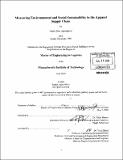Measuring environmental and social sustainability in the apparel supply chain
Author(s)
Agbonkhese, Sophie Elise
DownloadFull printable version (10.45Mb)
Other Contributors
Massachusetts Institute of Technology. Engineering Systems Division.
Advisor
Edgar Blanco.
Terms of use
Metadata
Show full item recordAbstract
Historically, the apparel industry has operated in an unsustainable way. Materials, energy, and other resources are used inefficiently throughout the apparel supply chain, leading to unsustainable levels of waste generation. Post-purchase use and disposal are rarely considered during the design and production of apparel products. Apparel companies are becoming more cognizant of their environmental impact and are implementing sustainability programs to counteract these issues. The field of sustainable supply chain management is a relatively new concept and companies face the challenges of choosing sustainability initiatives, measuring the success of those initiatives, and assessing their overall progress toward sustainability. This thesis addresses these three challenges. First, it compiles a comprehensive set of nearly 300 sustainability initiatives used by eight apparel companies. Second, it documents the initiatives' associated metrics, which were found to exist for only 30 percent of the initiatives. Third, it provides a system for measuring overall corporate sustainability through an initiative classification scheme. It was determined that three of the eight companies studied embody the highest level of corporate sustainability. The industry has made progress toward becoming more sustainable, but cannot be truly sustainable until systemic changes are made to the design, production, use, and disposal stages of the apparel product life cycle.
Description
Thesis (M. Eng. in Logistics)--Massachusetts Institute of Technology, Engineering Systems Division, 2010. Cataloged from PDF version of thesis. Includes bibliographical references (p. 68-73).
Date issued
2010Department
Massachusetts Institute of Technology. Engineering Systems DivisionPublisher
Massachusetts Institute of Technology
Keywords
Engineering Systems Division.